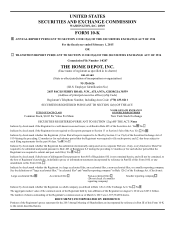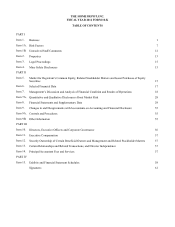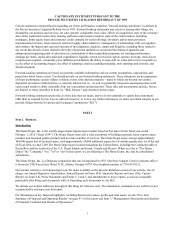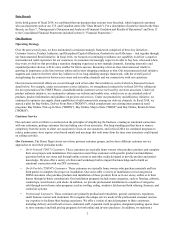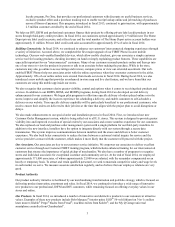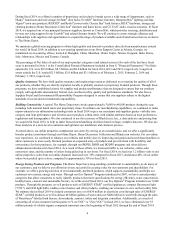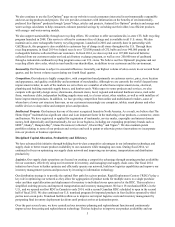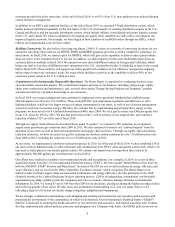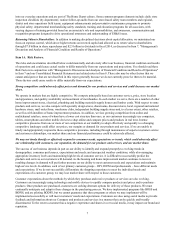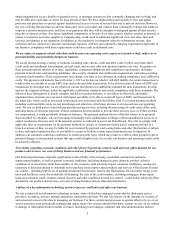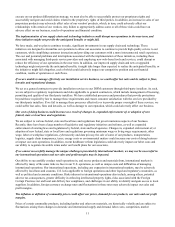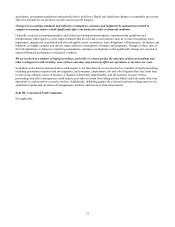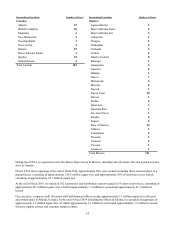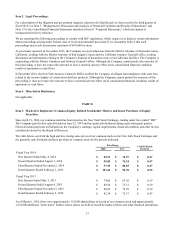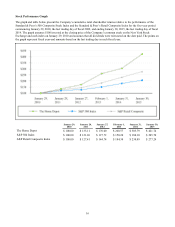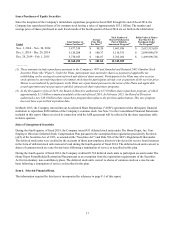Home Depot 2014 Annual Report Download - page 14
Download and view the complete annual report
Please find page 14 of the 2014 Home Depot annual report below. You can navigate through the pages in the report by either clicking on the pages listed below, or by using the keyword search tool below to find specific information within the annual report.9
obtain unauthorized access, disable or degrade service, or sabotage systems are also constantly changing and evolving, and
may be difficult to anticipate or detect for long periods of time. We have implemented and regularly review and update
processes and procedures to protect against unauthorized access to or use of secured data and to prevent data loss. However,
the ever-evolving threats mean we and our third-party service providers and vendors must continually evaluate and adapt our
respective systems and processes, and there is no guarantee that they will be adequate to safeguard against all data security
breaches or misuses of data. Any future significant compromise or breach of our data security, whether external or internal, or
misuse of customer, associate, supplier or Company data, could result in additional significant costs, lost sales, fines and
lawsuits, and damage to our reputation. In addition, as the regulatory environment related to information security, data
collection and use, and privacy becomes increasingly rigorous, with new and constantly changing requirements applicable to
our business, compliance with those requirements could also result in additional costs.
We are subject to payment-related risks that could increase our operating costs, expose us to fraud or theft, subject us to
potential liability and potentially disrupt our business.
We accept payments using a variety of methods, including cash, checks, credit and debit cards, PayPal, our private label
credit cards and installment loan program, and gift cards, and we may offer new payment options over time. Acceptance of
these payment options subjects us to rules, regulations, contractual obligations and compliance requirements, including
payment network rules and operating guidelines, data security standards and certification requirements, and rules governing
electronic funds transfers. These requirements may change over time or be reinterpreted, making compliance more difficult or
costly. The payment card industry has set October 1, 2015 as the date on which it will shift liability for certain transactions to
retailers who are not able to accept EMV chip card credit and debit transactions. To be able to accept all forms of EMV card
transactions by the target date, we are reliant on various third parties to establish the standard for such transactions, develop
and test the required software, define the applicable certification standards, and certify compliance with those standards. The
failure of these third parties to timely complete and deliver needed elements, or our failure to effectively and timely
implement those elements once received, will impact our ability to be able to accept all types of EMV card transactions by
the target date, which could in turn result in increased costs associated with the liability shift. For certain payment methods,
including credit and debit cards, we pay interchange and other fees, which may increase over time and raise our operating
costs. We rely on third parties to provide payment processing services, including the processing of credit cards, debit cards,
and other forms of electronic payment. If these companies become unable to provide these services to us, or if their systems
are compromised, it could potentially disrupt our business. The payment methods that we offer also subject us to potential
fraud and theft by criminals, who are becoming increasingly more sophisticated, seeking to obtain unauthorized access to or
exploit weaknesses that may exist in the payment systems, as reflected in our recent Data Breach. If we fail to comply with
applicable rules or requirements for the payment methods we accept, or if payment-related data is compromised due to a
breach or misuse of data, we may be liable for costs incurred by payment card issuing banks and other third parties or subject
to fines and higher transaction fees, or our ability to accept or facilitate certain types of payments may be impaired. In
addition, our customers could lose confidence in certain payment types, which may result in a shift to other payment types or
potential changes to our payment systems that may result in higher costs. As a result, our business and operating results could
be adversely affected.
Uncertainty regarding economic conditions and other factors beyond our control could adversely affect demand for our
products and services, our costs of doing business and our financial performance.
Our financial performance depends significantly on the stability of the housing, residential construction and home
improvement markets, as well as general economic conditions, including changes in gross domestic product. Adverse
conditions in or uncertainty about these markets or the economy could adversely impact consumer confidence, causing our
customers to delay purchasing or determine not to purchase home improvement products and services. Other factors beyond
our control – including high levels of unemployment and foreclosures; interest rate fluctuations; fuel and other energy costs;
labor and healthcare costs; the availability of financing; the state of the credit markets, including mortgages, home equity
loans and consumer credit; weather; natural disasters and other conditions beyond our control – could further adversely affect
demand for our products and services, our costs of doing business and our financial performance.
A failure of a key information technology system or process could adversely affect our business.
We rely extensively on information technology systems, some of which are managed or provided by third-party service
providers, to analyze, process, manage and protect transactions and data. We also rely heavily on the integrity of, security of
and consistent access to this data in managing our business. For these systems and processes to operate effectively, we or our
service providers must periodically maintain and update them. Our systems and the third-party systems we rely on are subject
to damage or interruption from a number of causes, including power outages; computer and telecommunications failures;


